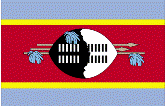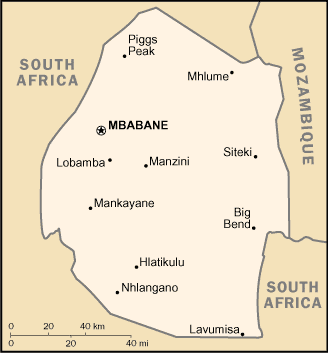|
Eswatini
|

|
Capital: Mbabane
Population: 1,148,130
Brief History of Eswatini:
The people of Eswatini (Swaziland) migrated from Mozambique. They then moved north to the current area of Swaziland when pushed out of the south by the stronger Zulu tribes. The Swazis gained strength and unity in the 1840s under the leader ship of Mswati II. Mswati II asked the Britich for help against Zulu raids.
For a period of time Swaziland was administered by South Africa and then became under British control in 1902. It became an independent country in 1968. The country was known by the name Swaziland until 2018 when the official name was changed to Eswatini.
The Geography of Eswatini
Total Size: 17,363 square km
Size Comparison: slightly smaller than New Jersey
Geographical Coordinates: 26 30 S, 31 30 E
World Region or Continent: Africa
General Terrain: mostly mountains and hills; some moderately sloping plains
Geographical Low Point: Great Usutu River 21 m
Geographical High Point: Emlembe 1,862 m
Climate: varies from tropical to near temperate
Major cities: MBABANE (capital) 74,000 (2009)
The People of Eswatini
Type of Government: monarchy
Languages Spoken: English (official, government business conducted in English), siSwati (official)
Independence: 6 September 1968 (from the UK)
National Holiday: Independence Day, 6 September (1968)
Nationality: Swazi(s)
Religions: Zionist 40% (a blend of Christianity and indigenous ancestral worship), Roman Catholic 20%, Muslim 10%, Anglican, Bahai, Methodist, Mormon, Jewish and other 30%
National Symbol: lion; elephant
National Anthem or Song: Nkulunkulu Mnikati wetibusiso temaSwati (Oh God, Bestower of the Blessings of the Swazi)
Economy of Eswatini
Major Industries: mining (coal, raw asbestos), wood pulp, sugar, soft drink concentrates, textile and apparel
Agricultural Products: sugarcane, cotton, corn, tobacco, rice, citrus, pineapples, sorghum, peanuts; cattle, goats, sheep
Natural Resources: asbestos, coal, clay, cassiterite, hydropower, forests, small gold and diamond deposits, quarry stone, and talc
Major Exports: soft drink concentrates, sugar, wood pulp, cotton yarn, refrigerators, citrus and canned fruit
Major Imports: motor vehicles, machinery, transport equipment, foodstuffs, petroleum products, chemicals
Currency: lilangeni (SZL)
National GDP: $6,231,000,000
** Source for population (2012 est.) and GDP (2011 est.) is CIA World Factbook.
Back to Geography Home Page
